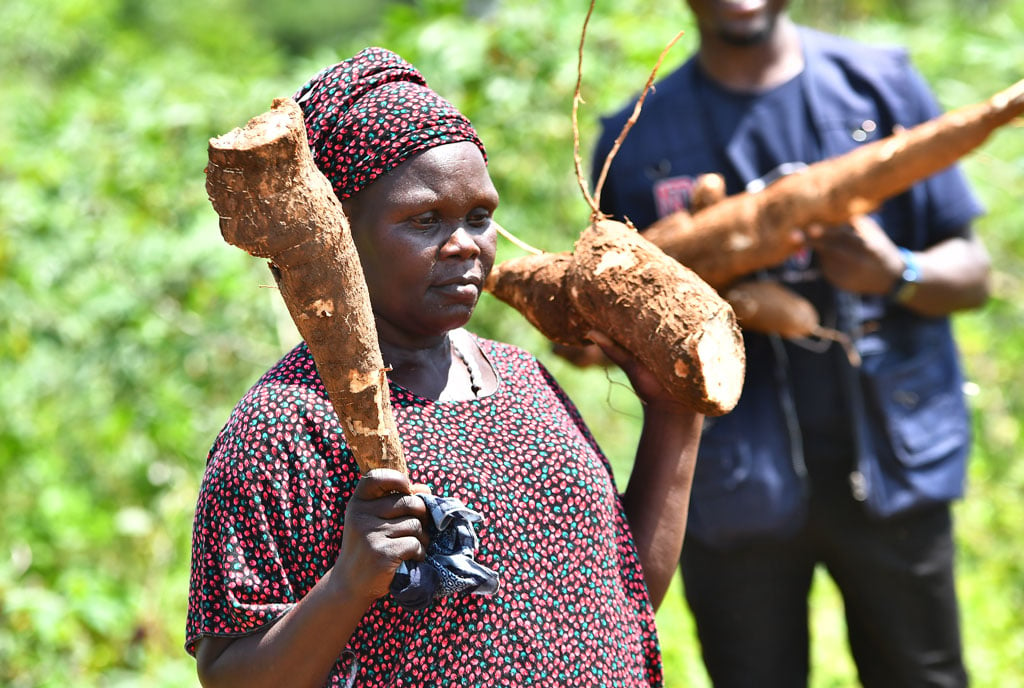Empowering rural women is critical in achieving global sustainability

Farmer Betty Amoding walks with cassava tubers harvested from a garden on May 14, 2024 in Kumi District. PHOTO/MICHAEL KAKUMIRIZI
What you need to know:
- Limited access to resources like land, credit, education, and technology, along with socio-economic barriers such as gender inequality and marginalisation from decision-making processes, hinders their ability to thrive.The impact of climate change has disproportionately affected rural women, threatening their livelihoods.
Every year on October 15, the world pauses to celebrate the International Day of Rural Women, established by the United Nations General Assembly in 2007. This day is a crucial reminder of the indispensable contributions that rural women make to agricultural production, food security, and the fight against poverty.
The 2024 theme, "Rural women cultivating good food for all," emphasises the pivotal role of rural women in cultivating food, promoting sustainable development, and enhancing climate resilience. This focus could not be more timely. Rural women comprise a significant portion of the agricultural labour force in Uganda and many other countries.
Yet, despite their contributions to food production and community wellbeing, they remain largely invisible and undervalued. Globally, rural women are at the forefront of feeding the world, often ensuring food security for their households and entire communities. Their traditional knowledge of sustainable farming practices and conservation techniques has proven crucial in the face of climate change, making them critical actors in building climate resilience.
According to the Uganda Bureau of Statistics, rural women in Uganda are responsible for more than 80 percent of food production. Many are involved in women-led agricultural initiatives that prioritise environmental conservation. These initiatives, from tree-planting projects to organic farming techniques, ensure a stable food supply, combat land degradation, and support biodiversity. Yet, rural women face significant challenges that impede their full potential.
Limited access to resources like land, credit, education, and technology, along with socio-economic barriers such as gender inequality and marginalisation from decision-making processes, hinders their ability to thrive. The impact of climate change has disproportionately affected rural women, threatening their livelihoods.
As the effects of extreme weather conditions increase, these women, already overburdened by unpaid care work and lacking access to healthcare, must navigate the complexities of climate-induced crop failure and food shortages. However, their resilience is truly inspiring. Many have adopted climate-smart agricultural practices, learning to adapt to these changes and safeguard food security. The importance of addressing these challenges is critical to achieving the United Nations Sustainable Development Goals (SDGs), particularly SDG 5 (Gender Equality) and SDG 2 (Zero Hunger).
Legal reforms that ensure rural women's land rights, education, and healthcare are essential to unlocking their full potential. In some countries, Uganda inclusive, programmes promoting gender-based violence prevention in land ownership and implementing climate-smart agricultural practices are slowly beginning to empower women to become agents of change in their communities. Technology offers a promising path forward. Access to digital tools and mobile technologies can help rural women improve crop yields, access markets, and make informed decisions.
Additionally, community-based solutions such as microfinance, women's cooperatives, and vocational training programmes are crucial in enabling women's economic empowerment and enhancing their leadership potential.Collaboration is not just beneficial; it's essential. Governments, NGOs, and the private sector must urgently collaborate to support rural women's rights, entrepreneurship, and leadership. Investment in rural infrastructure, such as education, healthcare, and clean energy, will benefit rural women and their communities as a whole. By prioritising rural women in national and regional development plans, policymakers can help break the cycle of poverty and create pathways to sustainable development.
As we celebrate this year's International Day of Rural Women, let us acknowledge the strength and resilience of rural women in the face of adversity. Their leadership in agriculture and climate action is essential to global sustainability efforts. We must continue advocating for policies and initiatives that empower rural women, ensuring they are recognised for their contributions and supported in ways that allow them to reach their full potential.
This includes legal reforms that ensure rural women's land rights, finance, education, and healthcare.Rural women are the backbone of agricultural production and food security. We must centre their voices and contributions in the conversation to achieve a more just, equitable, and sustainable world. Let this day serve as a call to action for the government, organisations, and communities to invest in rural women and champion their rights.
Winfred Naigaga Kyobiika, is a Chief Magistrate in the Ugandan Judiciary, and a gender expert.



